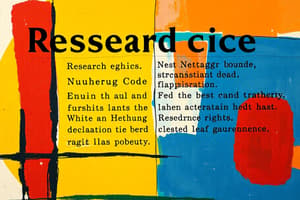Podcast
Questions and Answers
What year was the global guidelines for ethics in research on humans issued following the review of previous guidelines?
What year was the global guidelines for ethics in research on humans issued following the review of previous guidelines?
- 1982
- 2002
- 1992 (correct)
- 1990
Which of the following is NOT a characteristic that a scientific researcher should possess?
Which of the following is NOT a characteristic that a scientific researcher should possess?
- Creativity (correct)
- Transparency
- Integrity
- Credibility
What is a crucial aspect of credibility in research as mentioned in the content?
What is a crucial aspect of credibility in research as mentioned in the content?
- Citing only favorable data
- Conducting research without peer review
- Manipulating results for better acceptance
- Reporting results as they appeared (correct)
What is the primary function of research ethics committees?
What is the primary function of research ethics committees?
Which of the following actions compromises the ethical standards of a researcher?
Which of the following actions compromises the ethical standards of a researcher?
Why is it important for research ethics committees to review projects before implementation?
Why is it important for research ethics committees to review projects before implementation?
What does the ethical guideline emphasize regarding the use of others' results in research?
What does the ethical guideline emphasize regarding the use of others' results in research?
What aspect do research ethics committees prioritize in their evaluations?
What aspect do research ethics committees prioritize in their evaluations?
Which of the following is NOT a concern of research ethics committees?
Which of the following is NOT a concern of research ethics committees?
How do research ethics committees help maintain trust in the research process?
How do research ethics committees help maintain trust in the research process?
What should be avoided when conducting research regarding authorship?
What should be avoided when conducting research regarding authorship?
Which part of the research structure is primarily focused on the research methodology?
Which part of the research structure is primarily focused on the research methodology?
What role does a scientific supervisor play in the research process?
What role does a scientific supervisor play in the research process?
What is the purpose of the 'Conclusion and Recommendations' section in research?
What is the purpose of the 'Conclusion and Recommendations' section in research?
How can one maintain academic integrity when using others' ideas in research?
How can one maintain academic integrity when using others' ideas in research?
What is one significant reason for emphasizing research ethics?
What is one significant reason for emphasizing research ethics?
What document was established to outline ethical principles for experiments on human subjects after World War II?
What document was established to outline ethical principles for experiments on human subjects after World War II?
In what year was the Helsinki Declaration approved by the World Medical Association?
In what year was the Helsinki Declaration approved by the World Medical Association?
What was revisited in 1982 by the Conference of World Medical Organizations?
What was revisited in 1982 by the Conference of World Medical Organizations?
Which research context can committees operate at?
Which research context can committees operate at?
Flashcards
Research Ethics Committees
Research Ethics Committees
These committees play a crucial role in ensuring ethical research practices before any research project is conducted.
Ethics Review Committees
Ethics Review Committees
These committees review research projects for compliance with ethical regulations and guidelines.
Ethics Approval
Ethics Approval
Before a research study can begin, the research project is reviewed by an ethics committee to ensure potential participants are protected and their rights are upheld.
Participant Safety
Participant Safety
Signup and view all the flashcards
Participant Rights
Participant Rights
Signup and view all the flashcards
Nuremberg Code
Nuremberg Code
Signup and view all the flashcards
The Nuremberg Code
The Nuremberg Code
Signup and view all the flashcards
The Declaration of Helsinki
The Declaration of Helsinki
Signup and view all the flashcards
The World Medical Association (WMA) revises both the Declaration of Helsinki and the Nuremberg Code.
The World Medical Association (WMA) revises both the Declaration of Helsinki and the Nuremberg Code.
Signup and view all the flashcards
Why is Ethical Research so Important?
Why is Ethical Research so Important?
Signup and view all the flashcards
Research Integrity
Research Integrity
Signup and view all the flashcards
Ethical Guidelines for Research
Ethical Guidelines for Research
Signup and view all the flashcards
World Medical Association (WMA) Declaration of Helsinki
World Medical Association (WMA) Declaration of Helsinki
Signup and view all the flashcards
Accurate Reporting of Findings
Accurate Reporting of Findings
Signup and view all the flashcards
Proper Attribution
Proper Attribution
Signup and view all the flashcards
Citing Sources
Citing Sources
Signup and view all the flashcards
Appropriate Research Experience
Appropriate Research Experience
Signup and view all the flashcards
Abstract
Abstract
Signup and view all the flashcards
Material & Method
Material & Method
Signup and view all the flashcards
Discussion
Discussion
Signup and view all the flashcards
Study Notes
Ethical Considerations in Research
- Research ethics committees review projects to ensure participant safety and rights, following ethical guidelines.
- These committees can be local, international, or within educational/healthcare institutions.
- History shows instances of unethical research practices, like Nazi medical experiments, highlighting the need for ethical standards.
- The Nuremberg Code (post-WWII) established ethical guidelines for human experimentation.
- The Declaration of Helsinki (1964, updated) is a global medical association's guide for medical research.
- In 1982, the Nuremberg Code and Declaration of Helsinki were revisited by global medical associations
- Further guidelines and revisions emerged for human research ethics .
- Ethical research requires adherence to established principles and guidelines.
Characteristics of a Research Scientist
- Researchers should display integrity and honesty.
- Results must be reported accurately.
- Avoid altering or fabricating data.
- Avoid plagiarism.
- Properly cite sources for all ideas.
- Avoid falsely claiming contributions by others.
- Must keep experience/training in line with current work.
- Consult experienced researchers when necessary.
Structure of a Scientific Research Paper
- Abstract: Summary of the research.
- Introduction: Context of the research topic.
- Aim of Study: Research objective(s).
- Methodology: Procedures employed.
- Results: Findings.
- Discussion: Interpretation of results.
- Conclusion and Recommendations: Summary and implications.
- Literature Cited/References: Sources consulted.
Studying That Suits You
Use AI to generate personalized quizzes and flashcards to suit your learning preferences.




